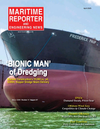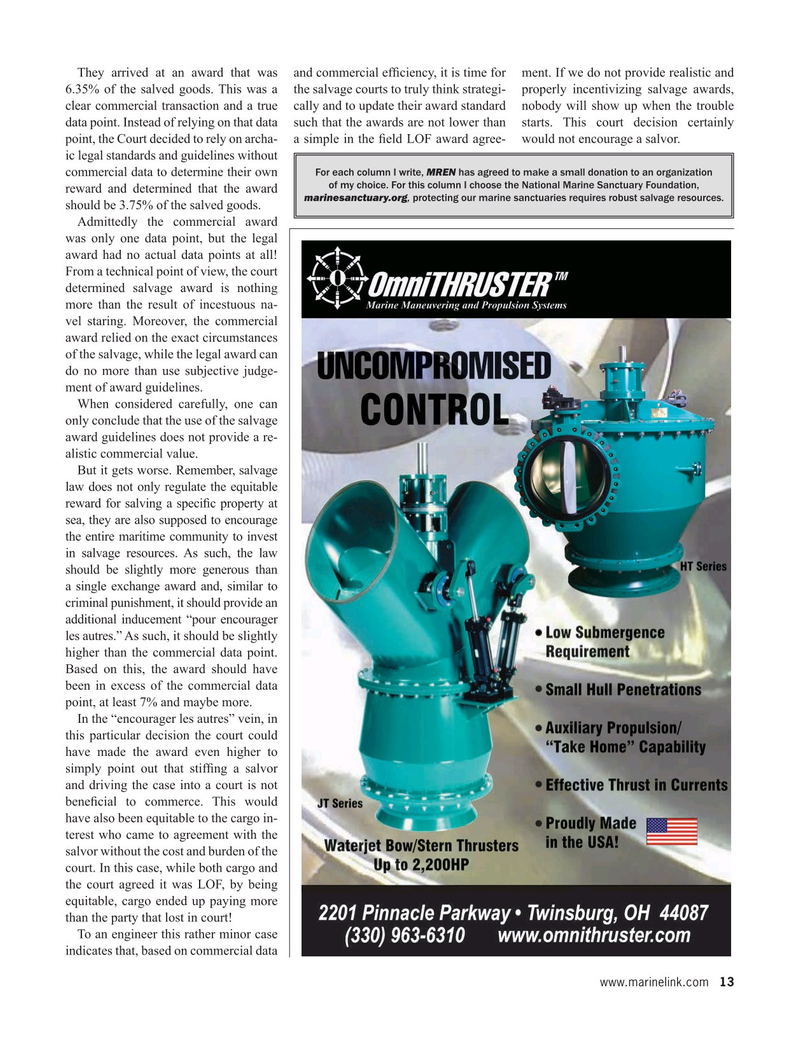
Page 13: of Maritime Reporter Magazine (April 2025)
Read this page in Pdf, Flash or Html5 edition of April 2025 Maritime Reporter Magazine
They arrived at an award that was and commercial ef? ciency, it is time for ment. If we do not provide realistic and 6.35% of the salved goods. This was a the salvage courts to truly think strategi- properly incentivizing salvage awards, clear commercial transaction and a true cally and to update their award standard nobody will show up when the trouble data point. Instead of relying on that data such that the awards are not lower than starts. This court decision certainly point, the Court decided to rely on archa- a simple in the ? eld LOF award agree- would not encourage a salvor.
ic legal standards and guidelines without
For each column I write, MREN has agreed to make a small donation to an organization commercial data to determine their own of my choice. For this column I choose the National Marine Sanctuary Foundation, reward and determined that the award marinesanctuary.org, protecting our marine sanctuaries requires robust salvage resources.
should be 3.75% of the salved goods.
Admittedly the commercial award was only one data point, but the legal award had no actual data points at all!
From a technical point of view, the court determined salvage award is nothing more than the result of incestuous na- vel staring. Moreover, the commercial award relied on the exact circumstances of the salvage, while the legal award can do no more than use subjective judge- ment of award guidelines.
When considered carefully, one can only conclude that the use of the salvage award guidelines does not provide a re- alistic commercial value.
But it gets worse. Remember, salvage law does not only regulate the equitable reward for salving a speci? c property at sea, they are also supposed to encourage the entire maritime community to invest in salvage resources. As such, the law should be slightly more generous than a single exchange award and, similar to criminal punishment, it should provide an additional inducement “pour encourager les autres.” As such, it should be slightly higher than the commercial data point.
Based on this, the award should have been in excess of the commercial data point, at least 7% and maybe more.
In the “encourager les autres” vein, in this particular decision the court could have made the award even higher to simply point out that stif? ng a salvor and driving the case into a court is not bene? cial to commerce. This would have also been equitable to the cargo in- terest who came to agreement with the salvor without the cost and burden of the court. In this case, while both cargo and the court agreed it was LOF, by being equitable, cargo ended up paying more than the party that lost in court!
To an engineer this rather minor case indicates that, based on commercial data www.marinelink.com 13
MR #4 (1-17).indd 13 4/2/2025 9:27:34 AM

 12
12

 14
14
